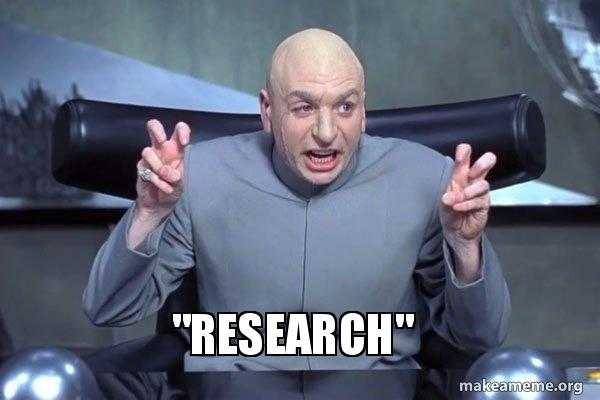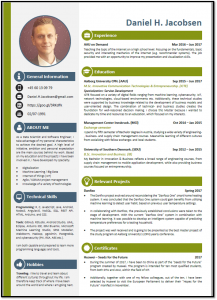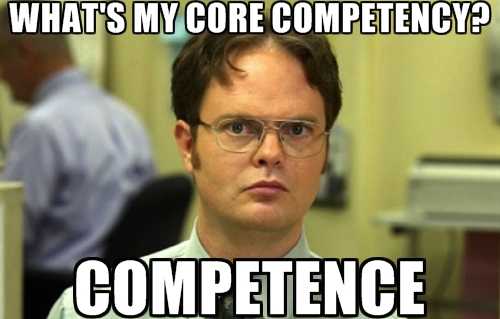The Pursuit Of A Dream Job
Jobhunting Guide
The Pursuit Of A Dream Job
Job hunting is like any other market. There are a supply and demand, and dependent on how the overall state of the market is, one of the sides will have the upper hand. I have written this article to show my take on how to find the most suitable job. Dependent on your situation or skills in the field of job searching, you might want to read some of the sections, maybe all of them, or maybe not. I can unfortunately not promise any results from using my tips, but you will hopefully come a step closer to the dream job.
The article has been separated into three main section Before Applying, After Applying and Additional Tips. I hope this will help some of you and if you have some other great jobhunting tips, please feel free to share them in the comment section below.
Remember that this is just my opinion based on my own experience. My advice might not be suitable for your situation, but I believe reading this will not hurt your chances of landing the dream job.

Before Applying
1. Research – Knowledge Is Power
Research is the key to knowledge and knowledge is the key to power. When entering any new field I would always recommend that you do your homework and become capable of standing your own in a debate. Given that this article will primarily be focusing on job hunting for graduate (given my experience), I will argue that you can look at it as a new field of knowledge. Below I have listed three core areas which I believe will be necessary to investigate in-depth before starting applying for jobs.
The Job Environment
who is theoretically on the offensive and defensive side of the “battle”. Are companies struggling to get people in or are people struggling to get employed? Find actual research and statistics, do not rely on face-to-face communication. Different person different situation. Who knows where they got their information from?
Job Listings
Find 20-30 job listings which fits what you would like to work with. If you cannot find them locally or nationally, then go worldwide. Read all job listings and extract requested competencies, skills or other trends from the listing. Rank all extracted words on a list to see what is the most desirable skill within the field which you are hoping to join. If you are not capable of fulfilling the top five, then you know what to use your time for in between applying for jobs and what to be aware of when sending applications or going to job interviews.
Salary
This is naturally not as important as finding the dream job and because it is your first job, you will automatically rise through salary levels over the next couple of years. However, It certainly does not hurt to know what to expect when it comes to salary and bonus arrangements. Is the salary including a pension, social security, daily lunch, company computer or smartphone? For my situation, I was especially interested in knowing if I would have time for holidays within the first year and how much I would have. Statistics showed that more than 55% of newly graduated from 2016 had more than five weeks of holiday (IDA salary survey).

2. CV – Tell Your Story Correctly
We all know what a CV is and it is easy to find good articles of how to write a good CV, so I will spar you the effort of reading yet another introduction to writing an interesting CV. However, I do what to make a point related to the CV. Your CV should not be a static document. It should be dynamic.
You have probably worked on several different projects or cases throughout your education. These projects might have had different focuses, which could be interesting for different companies, dependent on the field of industry and specific job role. For example
If you are applying for a job where you will be working with recommendation algorithms (Netflix, eBay etc.),
then you also want to mention the project where you build your own movie recommendation website.
Over time I build several versions of my CV, which I would later use as building blocks for writing a perfectly tailor suited version of my CV for new applications.
This does naturally not only apply to the projects you have been involved in. You should also think about the ordering of listing your competence and skills, the depth that you explain parts of your education, and so on. If one of your courses in particular would be of interest to the hiring manager to know about, then highlight your performance in that course.
3. Fiverr – Your Own Personal Multimedia Designer
Have you ever seen one of those super clean and sharp CVs on LinkedIn? A CV where you are already blown away by the visual representation? I have personally seen several of these. Even though I did not have any personal gains of reading these CV, I still did. It was simply inviting me to read it. Now imagine you are the hiring manager evaluating hundreds of applications. When he/she notices this type of CV, it will increase the chances of them both remembering and reading everything dramatically. It is therefore highly desirable to have this type of CV. But how to you gain this?
If you do not already know Fiverr, then it is about time you get familiar with this online service. Fiverr is a website where you can get services done at the low cost of five US dollar (approx. 30 DKK). These services include everything from prank calls, tutorials, and multimedia support. That is right! You can get an experienced multimedia designer to create a sharp CV layout for you within 24 hours. This type of service is common on Fiverr and they have therefore become very advanced in terms of customization. They will design it according to your industry, your personal color scheme and create a Word files which you can later adjust according to the job role (Point 3. – CV).
Below you will be able to see how my CV looked after I had a multimedia designer look at it. If you are capable of creating the same type of CV layout, then you can neglect this point. However, if you are like most of us, then use five dollars on this professional service.

Figure 1: Personalized CV by Fiverr multimedia service.
4. Pre-Application Communication – Five Minutes On The Phone
After reading a job listing you should always look for opportunities for interesting questions. Questions which will show the hiring manager that you have invested both time and thoughts into reading and understanding the job listing. I would for example often question phrases such as “You will be working together with a diverse team.” – What is the size of the team, what would my specific role be within the team, will I be given someone to spar with during the startup phase? Such questions are naturally important for you too because you will be able to quickly determine whether you will be comfortable in this sort of work environment.
Additionally, these questions will make you stand out in the upcoming application process because the hiring manager will remember you. The questions will also make you appear sharper in the interviews, because you have more information than the other, and can, therefore, prepare more in-depth questions.
It might be scary to do the initial communication with the company, but I highly recommend calling or writing the contact person before sending your application. Even if you are not capable of reaching the contact person immediately.
I have personally attempted for several days to get in contact with a specific hiring manager. His schedule was unfortunately packed that week, and he apologized for not being more available when I finally reached him. He was impressed of my effort in attempting to get in contact with him, which I argue did not hurt my chance for the future selection period.
5. LinkedIn – The One Tool For Being Recruited
LinkedIn is currently, in my opinion, the strongest tool in the pursuit of finding the dream job. The platform has been made with a lot of interesting functionalities available, which allows you to increase the chances of getting in contact with the right people at the desired company. As some of you may know, LinkedIn is a large platform, one I could easily write an entire article about on it own, which is why I have separated this section into two smaller bits. Initially, I am going to talk about the offensive side, researching positions, companies and people and how to get their attention, followed by the defensive side, your profile and how it represents you in the best way possible.

[DISCLAIMER] Before I start rambling about my experience and advises related to LinkedIn it would be appropriate to note that I am not in any way trained or certified in how to use the LinkedIn platform. I am just a person, who has had some personal experiences related to my own use of the platform and I believe that you or anyone else should be able to gain the same positive results, by replicating my actions.
Offensive – Research And Attract Attention To Your Profile
Finding your dream job would be easy if there was only a certain amount of companies and positions available. However, the truth is that there are way too many companies out there with equally many positions available. LinkedIn provides the best platform to gain an overview of these companies and their individual position. I do realize that many other platforms also exist with the single purpose of job listings, but these platforms do not seem to attract the same amount of volume and diversity.
While I was still out looking for the dream job, I asked several hiring managers where they primarily published their job listings. Naturally, they would first say their own website, which dependent on the company’s online application form could be a varying experience. Some online application forms only allow a minimal amount of information (name, address, birthdate, education), which had to be answered in simple one-liners.
These sorts of application forms do not illustrate any of the applicant’s strengths or weaknesses and therefore creates a very generic image of who they are. When the hiring manager told me that this was their primary method of listing new job openings, I would specifically ask them if they did not use any external platforms. Although they may have said they used more than one external platform (Jobindex, Ofir, Jobfinder etc.), they all had one in common – LinkedIn. Regardless of how small or large the company, they all use LinkedIn for job listings, candidate investigation, and headhunting. I, therefore, believe that simply the amount of company’s using LinkedIn sets the argument for why you should put time and thoughts into the setup and management of your LinkedIn profile*.
Now that we have “determined” that LinkedIn has the largest collections of job listings, I would recommend you investigate these listings to find your dream job. I personally use technology keyword (Internet of Things, Machine Learning, Java etc.) as search terms and I will simultaneously keep track of the quality of the search result. Did I find what I expected, how many irrelevant listings was between the desirable once, was the search terms too specific?
I would often get a high quality of results by combining more search terms, but at the cost of the search results becoming narrower. I also invested some time to find synonyms for my search terms since it might vary how the companies formulated the same thing (e.g. Internet of Things – Smart device – IoT). When you find a combination of appropriate search terms with a high quality of the results you should create an automated notification so that you receive a notice every time a new job is announced.
This covers my main points of how to find the dream job on LinkedIn, but when the job has been found the platform can also be used to attract additional attention to your profile.
Normally, when I found a suitable job listing, I would establish communication with the hiring manager as I have already explained in a previous (Pre-Application Communication section). Directly after hanging up the phone, I would go on LinkedIn and find the hiring managers profile and sniff around. – But why? You could of cause say that you wanted to learn more about the hiring manager’s profile, which could in fact sometimes be valuable, but I was there to create a link between the phone conversation that we just had and our LinkedIn profile.
If you have used LinkedIn previously you probably already know that LinkedIn will notify you when someone has checked out your profile. This is the desired effect of sniffing around on the hiring managers profile – We are not actually sending a “Link” request. We are just notifying the hiring manager that we checked out their profile, and they will then have the possibility to check out our profile.
I remind you that this is before the hiring manager has even received your application. In the eyes of the hiring manager we just converted a five minutes phone conversation with a random person into a concrete LinkedIn profile. A profile, which might be generic for all companies, but still a representation of who you are and what you have done in your past. Ideally, your profile should be interesting enough for the hiring manager to be awaiting your actual custom-made application (CV section). However, for this to happen, your profile naturally must appear sharp, which brings us to the next section.
* – Noteworthy, I do realize that the use of LinkedIn may vary dependent on the industry sector, but do yourself a favor and investigate and keep updated if your sector is beginning to use LinkedIn as a hiring tool.
Defensive – Create The Best Possible Profile To Represent You
LinkedIn actually does a fine job assisting you in how to set up your profile. It tells you if you are missing information in the important columns or if you can improve your profile with a good profile picture or sharp resume. Therefore, I will not dive into what to write on your profile, but instead, I will put the focus on how to write the content of your profile.
Similarly, to Google, LinkedIn is a search engine. But instead of searching for websites on the internet, LinkedIn searches for people. An example could be if I typed “Machine Learning” in the search field, the result would then consist of people in- and outside my professional network with a relation to the topic of machine learning.
What does this mean to you? – It means that you should attempt to include words about your specialization into your profile. Some of the most important places to include these keywords are in your title*, resume and current occupation. Having your specialization included in at least these three fields will ensure that your profile will rank higher when a recruiter or hiring manager searches for your specialization. As an indication of how well you rank on the search result, you can observe how many recruiters visit your profile. I personally have around one every week checking out my profile and three times, while I was still jobhunting, these visiting recruiters contacted me.
If your profile is still not performing well in the search results, it might be worth investigating if you are using the correct words and phrases to present your specialization. Similarly, to the previous section (section 1.5 – Offensive – Research and attract attention to your profile.) you need to determine if there are synonyms of the words you are using (e.g. Internet of Things – Smart device – IoT). It might not immediately be possible to conclude which words are the correct or most effective to use, and will therefore sometimes be necessary to play around with them. I am confident that you at some point will see an effect of this.
*No need to write your generic job title (e.g. Graduate). It does not tell anything about what you work with.
6. Defining Your Competencies – Why Are You Different?
We all have strengths and weaknesses which we know. We use this information about ourselves to enhance our workflow in the best possible way. However, sometimes we might not be aware of all (or any) our personal characteristics. Maybe there has never been a case where you were forced to evaluate your personal strengths or weaknesses. Maybe you “sort of know” how you prefer to work, but have never defined your personal competencies. Well if that is the case, then it is now that you need to define what personality you bring to the table.
If you have ever been to a job interview for a similar job role as an ICT engineer, you will likely have experienced a personality test of some sort. From personal experience, I know that there are a lot of these tests on the market. Regardless of the format of this test, the result should be consistent with your personal characteristics. The company can from the result determine who you are and what they might investigate your personality before hiring you.

Maybe you have difficulties talking in large groups. A personal problem, which you have always ignored since the group did well without your inputs. These sort of characteristic will show up during the personality tests and your potential employer will most certainly want to investigate to what extent your problem goes. Therefore, I suggest that you prepare for these sorts of questions. How? By confronting yourself before they confront you.
Take similar tests at home and talk to people that you have worked with about the result. You want to share your results to gain objectivity and reference points. It might be that you haven’t been the most outgoing person in a past workgroup. Was that because you were introvert or was it because the rest of the group was extremely extrovert? You need to know these things about yourself so that you can stand confidently during a job interview.

If you are wondering what to do if you determine that you have a major personal weakness, which conflicts with the job position, then I suggest evaluating whether this is a position that you will feel comfortable taking on. Think about how your weakness might influence your performance or workflow and determine how you are going to solve this problem. When the time then comes, and the hiring manager asks you about this weakness, you are able to confirm that you have this weakness, but that you are aware of it and have a strategy for handling it professionally. Regardless of the weakness, you just earned the respect of the hiring manager by showcasing your problem and how you deal with it. Maybe it is not enough to get you the job, but it most certainly does not hurt your chances.
If you would like to give it a try and attempt a personality test, I have taken the liberty of finding a free online version: Link (Limited)
After Applying
1. Grades Are NOT Everything
In the beginning, I started by sending out a lot of applications to many different job listings, assuming that quantity was better than quality. Although my skills probably did not fulfill all of the required skills of the job, I was still pulled into interviews for the majority of the positions.
However, during the actual job interviews, it would, become clear that my profile and capabilities did not match the job position. Without any concrete evidence or fact to back me up I felt that my grades from my education were what got me into those interviews, but grade are NOT everything. Companies are much more interested in learning the person behind the application, CV, and transcript of records. If the person behind is not capable of matching the desired position or personal profile, which the company is seeking, they will naturally not hire him/her. I learned this during the initial period of jobhunting, which meant that my scope of the jobs was narrowed down. Luckily, there was still quite a few positions matching my specialization. It was evident that focus in job scope was much more successful as I quickly was invited to first, second and third interviews.
Take my point: good grades might get you to the first interview, while a true match in terms of competences and personality will get you to the second.
2. Prepare Questions – Imagine Starting The Job Tomorrow
When you then finally manage to get to an interview it is important that you prepare well. I would say that a job interview can be compared to an oral exam. If you do not take it seriously you will not appear sharp and to the point.
The day before an interview, I would dedicate the entire day to researching and writing questions for the interview. Regardless of my prior knowledge of the company and position, I was always determined to dig even deeper. To generate more questions, I would always imagine that I would be starting the position on the very next day. What would I need to know if I was to start tomorrow? – Who will I be working with, will there be an introduction phase, what is their expectation of me now and in one year? Using the kind of thinking encourages the urgency of getting concrete answers. Do not assume that you know how the company’s policies and work ethics affects you. Instead, ask the hiring manager directly and get a real answer.
Related to what you should bring to the interview. It was always recommended to me that you bring a pen, notebook and a copy of everything you send for the application. Yes, bring a copy yourself. I am sure that the hiring manager will have a copy of your CV and application on the table during the interview. However, you will appear unprepared if they ask you about the application, and you are not able to determine the context without having to ask for their copy. Therefore, bring your own and study them.
3. Prepare For Tests – Get In The Right State Of Mind
Before the actual interview, it might be that the company will request you to take one or more tests. These tests are for the majority designed to determine your intellect and personality. Regarding the personality test, no actual training or preparation exists. Just find a quiet place and think about your answers.
On the other hand, it is definitely possible to prepare for the intelligence test, which I strongly recommend. Many variations of these intelligence tests exist on the market. So, the first thing to do is to figure out how your test is specifically going to plan out. – Are the answers timed, can you go back to a previews questions, what are the topics of the tests and should you perhaps focus more on one topic than the others? You need to know this before clicking the “Start” button on the test so that you are not taken by surprise.
Additionally, when you know how the test is going to be, I would also suggest trying to find a free online version. Somewhere where you will be able to practice and get in the mindset of the questions. Here you will also be able to determine if there are certain categories, which you should avoid or skip.
When you finally have done all the above steps and feel prepared, that is when you are able to take the test and feel confident with your result afterwards.
4. Proof Of Your Talents
This is perhaps on of the strongest method to stand out in the interview and illustrate your skills and personality. It all revolves around proof of your statements, to show that your competencies and characteristics are actually matching to what your CV says about you. This means that every time you, for example, write “I am a very creative person”, you need to have a perfect professional example which illustrates this characteristic about you. Similarly goes for your skills, if you say that you have advanced Java programming skills or strong time management capabilities, then you need the same type of examples to back it up.
If you put yourself in the position of the hiring manager it makes sense that they need these types of examples to somehow quantify who you are and what you are capable of. The worst thing you can say to them when they ask about one of the characteristics you presented in your CV, would be “hmmm…. I would have to think about that.” Or “That is just who I am” – Anybody can say this! Why should they believe you?
You may have written many things about yourself in your CV. Too many things to give examples of all of them? – No! If you do not have a strong example of each individual skill and characteristic written on your CV, then you should probably reconsider whether to write it as part of your CV.
Additional Tips
Learn More – Online Courses, Events, Books, Podcasts Etc…
Given that the business world of today requires people to constantly develop themselves, it is never a bad idea to find ways of doing so. I have therefore as a final note made a list of the events and tools, which I use to develop my own skills. The frequency of which I use these tools will be changing a lot, but on average I believe that it will be approximately once a month. Hopefully, you will be able to finish an audiobook or participate in a meetup event with the same frequenc
| Online Courses: | Podcasts: | Events: | Books/Audiobooks: |
|---|---|---|---|
| Udemy | Software Engineering Radio | Hackathons | Audible |
| Coursera | Coding Blocks | Meetup | |
| Lynda | Fragmented | ||
| YouTube |

About
Hi, I'm the Author
My name is Daniel H. Jacobsen and I’m a dedicated and highly motivated software developer with a masters engineering degree within the field of ICT.
I have through many years of constantly learning and adapting to new challenges, gained a well-rounded understanding of what it takes to stay up to date with new technologies, tools and utilities.
The purpose of this blog is to share both my learnings and knowledge with other likeminded developers as well as illustrating how these topics can be taught in a different and alternative manner.
If you like the idea of that, I would encourage you to sign up for the newsletter.
Cheers! 🍺

